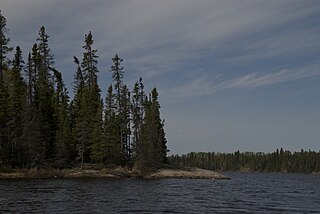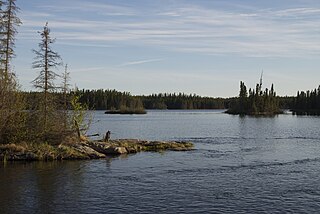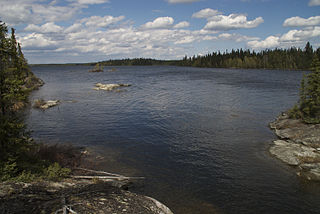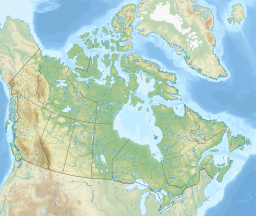
Lake Winnipeg is a very large, relatively shallow 24,514-square-kilometre (9,465 sq mi) lake in North America, in the province of Manitoba, Canada. Its southern end is about 55 kilometres (34 mi) north of the city of Winnipeg. Lake Winnipeg is Canada's sixth-largest freshwater lake and the third-largest freshwater lake contained entirely within Canada, but it is relatively shallow excluding a narrow 36 m (118 ft) deep channel between the northern and southern basins. It is the eleventh-largest freshwater lake on Earth. The lake's east side has pristine boreal forests and rivers that were in 2018 inscribed as Pimachiowin Aki, a UNESCO World Heritage Site. The lake is 416 km (258 mi) from north to south, with remote sandy beaches, large limestone cliffs, and many bat caves in some areas. Manitoba Hydro uses the lake as one of the largest reservoirs in the world. There are many islands, most of them undeveloped.

Bakers Narrows, Manitoba, is a small residential community approximately 20 km (12 mi) southeast of Flin Flon on Lake Athapapuskow. There are five subdivisions located near the lakeshore with a total of approximately 150 cottages, many of which are permanent residences.

Lake Athapapuskow is a glacial lake in Manitoba and Saskatchewan, Canada, located 15 km (9.3 mi) southeast of Flin Flon, Manitoba. The lake is in the Hudson Bay drainage basin and is the source of the Goose River.
Payuk Lake is a glacial lake located nine kilometres (5.6 mi) southeast of Bakers Narrows, Manitoba, Canada.

The Mistik Creek is a stream in the Hudson Bay drainage basin in the Northern Region of Manitoba, Canada, approximately 20 kilometres (12 mi) northeast of Bakers Narrows.

Neso Lake is a glacial lake on the Mistik Creek chain in the Hudson Bay drainage basin in the Northern Region of Manitoba, Canada. It sits in the Churchill River Upland portion of the Midwestern Canadian Shield forests which consist of mixed coniferous forest trees. The region around the lake consists of rocky parallel ridges with poorly drained areas of muskeg and irregular rocky shorelines due to intense glaciation. The lake is situated on the well known "Mistik Creek Loop", a remote canoe route which is 95 km (59 mi) in total length and can be paddled in four days.

Nisto Lake is a glacial lake on the Mistik Creek chain in the Hudson Bay drainage basin in the Northern Region of Manitoba, Canada. It sits in the Churchill River Upland portion of the Midwestern Canadian Shield forests which consist of mixed deciduous and coniferous trees. The region around the lake consists of rocky parallel ridges with poorly drained areas of muskeg and irregular rocky shorelines due to intense glaciation. The lake is situated on the well-known "Mistik Creek Loop", a remote canoe route which is 80 km in total length can be paddled in four days.

Nao Lake is a glacial lake on the Mistik Creek chain in the Hudson Bay drainage basin in the Northern Region of Manitoba, Canada. It sits in the Churchill River Upland portion of the Midwestern Canadian Shield forests which consist of mixed deciduous and coniferous trees. The region around the lake consists of rocky parallel ridges with poorly drained areas of muskeg and irregular rocky shorelines due to intense glaciation. The lake is situated on the well known "Mistik Creek Loop", a remote canoe route 95 kilometres (59 mi) in length which can be paddled in four days.

Nikotwasik Lake is narrow glacial lake on the Mistik Creek chain beneath the Vamp Creek confluence. It is in the Hudson Bay drainage basin in the Northern Region of Manitoba, Canada. It sits in the Churchill River Upland portion of the Midwestern Canadian Shield forests which consist of mixed deciduous and coniferous trees.

Tapukok Lake is narrow glacial lake on the Mistik Creek chain above the Vamp Creek confluence. It is approximately 19 kilometres (12 mi) northeast of Bakers Narrows and is situated in the Hudson Bay drainage basin in the Northern Region of Manitoba, Canada. It is surrounded by the Churchill River Upland portion of the Midwestern Canadian Shield forests which consist of mixed deciduous and coniferous trees.

Uyenanao Lake is a glacial lake on the Mistik Creek chain, approximately 20 kilometres (12 mi) northeast of Bakers Narrows. It is part of the Nelson River watershed, in the Hudson Bay drainage basin in the Northern Region of Manitoba, Canada. The surrounding mixed deciduous and coniferous forest is part of the Churchill River Upland portion of the Midwestern Canadian Shield forests. The region around the lake consists of rocky parallel ridges with poorly drained areas of muskeg and irregular stony shorelines due to intense glaciation. The lake is situated on the well known "Mistik Creek Loop", a remote canoe route 80 kilometres (50 mi) in length which can be paddled in four days.

Kakat Lake is a glacial lake at the confluence of Holt Lake and Mistik Creek, approximately 21 kilometres (13 mi) northeast of Bakers Narrows. As a segment of the Mistik Creek, it is part of the Nelson River watershed, in the Hudson Bay drainage basin in the Northern Region of Manitoba, Canada. The surrounding mixed deciduous and coniferous forest is part of the Churchill River Upland portion of the Midwestern Canadian Shield forests. The region around the lake consists of rocky parallel ridges with poorly drained areas of muskeg and irregular stony shorelines due to intense glaciation. The lake is situated on the well known "Mistik Creek Loop", a remote canoe route 95 kilometres (59 mi) in length which can be paddled in four days.

Mitatut Lake is a glacial lake above the confluence of Holt Lake and Mistik Creek, approximately 21 kilometres (13 mi) northeast of Bakers Narrows. As a segment of the Mistik Creek, it is part of the Nelson River watershed, in the Hudson Bay drainage basin in the Northern Region of Manitoba, Canada. The surrounding mixed deciduous and coniferous forest is part of the Churchill River Upland portion of the Midwestern Canadian Shield forests. The region around the lake consists of rocky parallel ridges with poorly drained areas of muskeg and irregular stony shorelines due to intense glaciation. The lake is situated on the well known "Mistik Creek Loop", a remote canoe route 80 kilometres (50 mi) in length which can be paddled in four days.

Payukosap Lake is a glacial lake above the confluence of Holt Lake and Mistik Creek, approximately 23 kilometres (14 mi) northeast of Bakers Narrows. As a segment of the Mistik Creek, it is part of the Nelson River watershed, in the Hudson Bay drainage basin in the Northern Region of Manitoba, Canada. The surrounding mixed deciduous and coniferous forest is part of the Churchill River Upland portion of the Midwestern Canadian Shield forests. The region around the lake consists of rocky parallel ridges with poorly drained areas of muskeg and irregular stony shorelines due to intense glaciation. The lake is situated on the well known "Mistik Creek Loop", a remote canoe route 80 kilometres (50 mi) in length which can be paddled in four days.

Nesosap Lake is a glacial lake on the Mistik Creek chain, approximately 21 kilometres (13 mi) northeast of Bakers Narrows. As a segment of the Mistik Creek, it is part of the Nelson River watershed, in the Hudson Bay drainage basin in the Northern Region of Manitoba, Canada.

Nistosap Lake is a glacial lake on the Mistik Creek chain, approximately 22 kilometres (14 mi) northeast of Bakers Narrows. As a segment of the Mistik Creek, it is part of the Nelson River watershed, in the Hudson Bay drainage basin in the Northern Region of Manitoba, Canada.
Naosap Lake is a glacial lake in Canada, located approximately 28 kilometres (17 mi) northeast of Bakers Narrows, Manitoba. As the source of the Mistik Creek, it is part of the Nelson River watershed, in the Hudson Bay drainage basin in the Northern Region of Manitoba.

Alberts Lake is a glacial lake approximately 17 km (11 mi) north-east of Bakers Narrows which drains into Thompson Lake. It is part of the Nelson River watershed, in the Hudson Bay drainage basin in Northern Manitoba, Canada.

Leo Lake is a small glacial lake approximately 15 kilometres (9.3 mi) northeast of Bakers Narrows which drains into Thompson Lake. It is part of the Nelson River watershed, in the Hudson Bay drainage basin in the Northern Region of Manitoba, Canada.

Naosap Mud Lake is a small glacial lake approximately 22 kilometres (14 mi) northeast of Bakers Narrows which drains into Naosap Lake. It is part of the Nelson River watershed, in the Hudson Bay drainage basin in the Northern Region of Manitoba, Canada.




















